The Hearing Rehabilitation Foundation (HRF) and the University of South Florida (USF) co-hosted the 7th International Adult Aural Rehabilitation Conference at the Sirata Resort and Conference Center in St. Pete Beach, Fla, in late May.

|
|
Academy of Rehabilitative Audiology speakers
|
The meeting is held every two years, and attracts participants from around the globe. This year’s conference, which was supported by donations from MED-EL Worldwide, Oticon US, Widex US, and Starkey, attracted over 70 registrants, and included representatives from Australia, Austria, Canada, Denmark, Germany, New Zealand, the United Kingdom, and the United States. The Invited Speakers at the conference were Samira Anderson from the University of Maryland, Melanie Ferguson from the National Hearing Biomedical Research Unit in Nottingham, UK, and Jean-Pierre Gagné from the University of Montreal, Canada.
The theme of the conference was “Maximizing the benefits of technology through innovative intervention,” and papers on the first day looked at improving auditory training opportunities for adults with acquired hearing losses. Melanie Ferguson introduced the topic in her presentation, and she was followed by Samira Anderson who showed the positive results obtained by older adults who had undergone an auditory training program. Presentations throughout the day emphasized that there is a growing awareness of the need for such training opportunities for older adults, presented either in the clinic, or via computer-based or online resources.
Jean-Pierre Gagné opened proceedings on the second day, with an overview of studies conducted to determine the amount of effort required to understand speech in difficult listening conditions. On the afternoon of the second day, there was a special presentation by representatives from the Academy of Rehabilitative Audiology. This session was chaired by Joe Montano, and had as its theme, “Patient Centered Care.” Louise Hickson, from the University of Queensland in Australia, spoke about work by her team to improve the content, design, and readability of hearing aid user guides. Papers presented during this session by Harry Levitt, Rachel Pizarek, and Terry Chisolm focused on evaluations of computer-based training programs for adults. This is an area of rapidly increasing interest, as “boomers” are now demanding that they receive assistance aimed at improving their listening skills.

|
|
Invited Speakers (l to r) Samira Anderson, |
Samira Anderson’s presentation on the third day of the conference looked at the effects of musical training on the perception of speech-in-noise. Her summary of work in this field indicated that music training has life-long benefits, and she postulated that music training for older adults may lead to benefits in their ability to better access the speech signal. Hearing aids were the primary focus of many presentations on the third day, and included papers by Don Schum from Oticon US, and Ian Henderson of Bloom Hearing Aids in Perth, Australia.
The attendees’ extremely positive evaluations of the meeting included the following comments:
“This was a great conference, probably the best in my experience.”
“Accessibility was superb! I have a severe hearing loss.”
“Well done. A good combination of research and practical/clinical information.”
“One of the best conferences I have ever attended!”
“Great atmosphere. Interesting topics. Wonderful people!”
The next conference in this series will be held in 2015. Check the HRF website www.hearf.org for regular updates.
SOURCE: HRF





